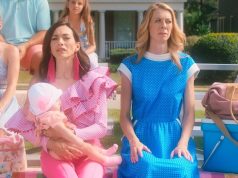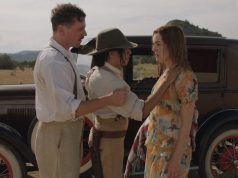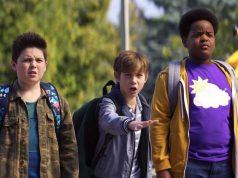The Oscar-nominated “Spellbound” owes its title to its subject, which is the 1999 national spelling bee. It is also an apt description of an audience watching the film, however: rapt, enthralled, enjoying every minute. I almost hate to tell you it’s a documentary, because I’m afraid you won’t believe me that it’s the most entertaining, suspenseful film I’ve seen all year.
The national spelling bee finals began with 249 kids, of which first-time filmmaker Jeffrey Blitz shows us eight. (One presumes he filmed more and chose the best ones for the final cut.) The major types are presented: Angela is an assuming Texas girl, the daughter of Mexican immigrants who work on a ranch for two half-deaf old racists; Nupur is a native of India, now living in Tampa, where the local Hooters restaurant wishes her “congradulations” on making the finals on its marquee; Ted, a taciturn middle-class Missouri kid, had never heard of the bee before his teachers introduced him to it, and he and his parents treat it as a fun event but not the end of the world if he loses; Emily is a precocious, wealthy Connecticut girl who wants to COMPETE and who plans to ring her au pair on the trip to Washington D.C.; Ashley lives in D.C., the determined daughter of a single African-American mother who works two jobs; Neil is another Indian kid, this time with seriously intense parents whose drive to help him win is astonishing; April’s a quiet thing with wacky Pennsylvania parents who put up stickers that say “bee yourself” on the fridge; and Harry is an Uber-nerdy Jewish kid in New Jersey who, like many too-smart boys his age, thinks he’s 1,000 percent funnier than he is.
There, ladies and gentlemen, are your finalists.
Four of them make it to the final 10, and I wouldn’t even dream of hinting at whether one of them wins, because “Spellbound’s” second half is all about the suspense. Reversals come from out of nowhere, and a dark-horse favorite emerges from beyond the ranks of the eight featured contestants. When hard words come up, we flash to pre-bee material to build the tension. The audience I saw the film with held its breath and was palpably relieved when the word was spelled correctly — or saddened when it wasn’t. It’s unpredictable precisely because it’s real life, and real life doesn’t always follow the conventions of storytelling. The person you think is going to win doesn’t always win.
Blitz captures it all with an eye for the drama and — especially — the humor of real life. He doesn’t pass judgment on anyone, but there’s a sly wit at work. Pretty much every scene in April’s house, for example, includes a lazy dog sprawled on the floor, and it becomes funnier each time you see it. You can’t write comedy like that.
Many of the contestants remind me of Lisa Simpson: too smart for their surroundings, and automatically isolated because of it. I mentioned the girl whose local Hooters wished her well. In addition, Ashley’s mother says, “I’m not thinking pestimistically (which is not a word), I’m thinking optimistically.” Angela’s situation in Texas, with her the hilarious old ranch owners, makes me laugh and cry. Most of these kids are smarter than their parents, I’d wager, and certainly smarter than their friends. The bee is a place for them to, well, “bee themselves,” though one past winner notes in an interview, “I don’t think it really helped me in my love life. That sort of thing could be regarded as a liability.”
A (1 hr., 35 min.; )





